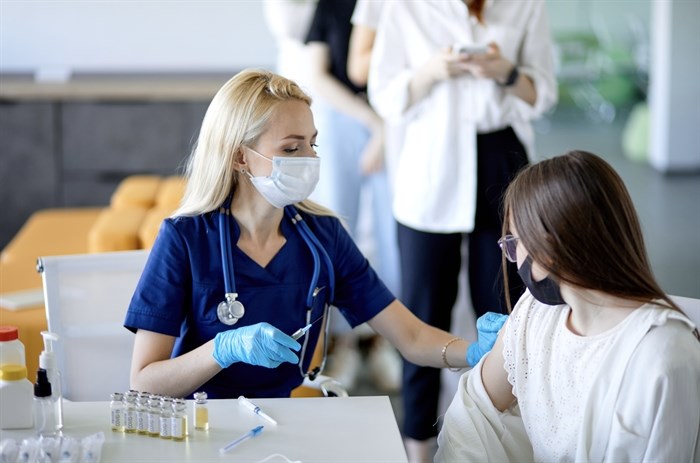
FILE PHOTO
February 15, 2022 - 10:18 AM
While there’s much talk about vaccine mandates being lifted and even masks coming off, for those who really don’t want to get infected with COVID, all those levels of protection are still vital.
Health authorities, like provincial health officer Dr. Bonnie Henry, have been very clear that booster doses go a long way to preventing severe illness but no one seems to want to talk about, or are able to talk about, whether the vaccines actually protect people from catching the virus.
“The reason why receiving a booster dose is important is that it brings the level of protection against an infection back up for people and will ensure longer lasting protection,” states a Ministry of Health email in response to an iNFOnews.ca request asking what per cent of people are protected from getting infected with various vaccination levels.
But, after three weeks of asking, the Ministry of Health still has not said what the percentage that “level of protection against an infection” might actually be.
“What we have observed is a generally sustained preservation of very high effectiveness against severe disease – for example 85-92% after two doses, six-plus months after the second dose when looking at protection against being hospitalized,” states a second email from the Ministry of Health. “What we also observe for those who have received two doses, usually more than six months since their second dose, is a vaccine effectiveness against Omicron that is low (the estimates vary) when looking at mild to moderate severity in disease. Booster doses bring the protection against mild to moderately severe infection back up (in the 70s and even 80s range), and a slight increase in protection against severe disease.”
So, clearly, there is strong protection against getting seriously ill with COVID, although that is not 100% and people are still dying, including 17 in B.C. over the weekend.
Do vaccines prevent infection?
The best estimates are that protection from infection dropped dramatically with Omicron for those with two doses, down to anywhere from zero to 40%. Studies show that a third dose gives 37% to 80% protection from actual infection.
A Canadian study from early December found the lowest protection rate, at 37%. But that was only seven days after getting the booster shot and was likely limited to a more susceptible population since, at that time, only the elderly and those with compromised immune systems were getting a third dose.
It cited one United Kingdom study that found 70% effectiveness against infection in the four weeks after the booster but then it waned.
“Initial studies suggest that two doses of the Pfizer-BioNTech COVID-19 vaccine offer 30 to 40% protection against infection,” states an article in Healthline. “With a booster, the Pfizer-BioNTech COVID-19 vaccine’s protection against infection rises to around 75%.”
That article was published Jan. 7 and noted that there are few “real world” studies on the effectiveness of the vaccines against Omicron.
HealthNewsReview.org published an article questioning the reliability of HealthLink, citing an earlier article about a new drug for treating secondary progressive multiple sclerosis.
“The story didn’t include key details like side effects, and it used a quote lifted directly from the drug company news release, among other problems,” the review article said.
The Canadian study was posted by MedRxiv (pronounced Medi-archive) which is a preprint services partly funded by Yale University. It notes that the study, dated Jan. 1, has not been peer reviewed.
“Preprints are preliminary reports of work that have not been certified by peer review,” MedRxiv highlights on their site in red. “They should not be relied on to guide clinical practice or health-related behavior and should not be reported in news media as established information.”
So, where does this leave all those who really don’t want to catch COVID, no matter how mild a case since they also face the risk of suffering long COVID afterwards?
READ MORE: Don’t dismiss Omicron variant of COVID as a mild illness: Dr. Henry
The reality is that, to be truly safe, all those layers of protection that Dr. Henry talks about need to stay in place. Get vaccinated and get a booster dose. Don’t go out if you’re sick. Wear a mask in indoor public spaces, especially if they’re crowded. Keep a safe distance from others. Wash hands frequently and keep your social circle small.
Dr. Henry is expected to announce some gradual easing of COVID restrictions later today, Feb. 15.
But the reality remains, there are still hundreds of new cases detected every day in B.C., which is a fraction of the number of actual cases since most people are told not to bother to get a COVID PCR test.
There are still hundreds of people in hospital with a COVID diagnosis and, as of yesterday, 119 in intensive care units in B.C.
To contact a reporter for this story, email Rob Munro or call 250-808-0143 or email the editor. You can also submit photos, videos or news tips to the newsroom and be entered to win a monthly prize draw.
We welcome your comments and opinions on our stories but play nice. We won't censor or delete comments unless they contain off-topic statements or links, unnecessary vulgarity, false facts, spam or obviously fake profiles. If you have any concerns about what you see in comments, email the editor in the link above.
News from © iNFOnews, 2022